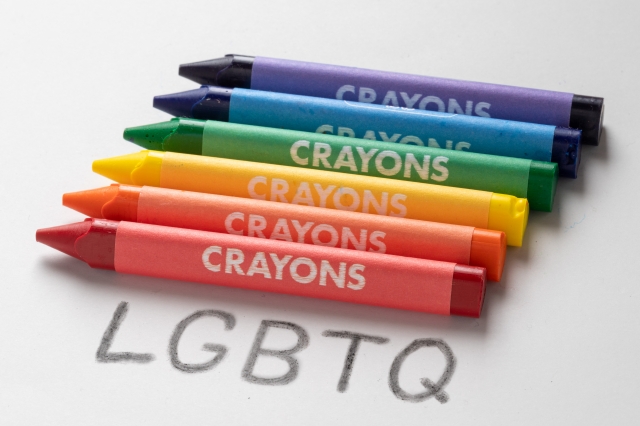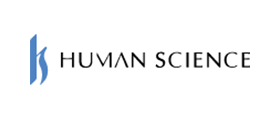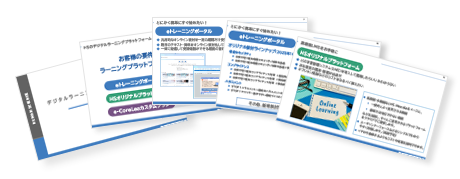2022.12.12
What should companies consider when implementing LGBT training in the workplace? Here are some examples!
In recent years, understanding and support for sexual minorities have been expanding.
Across the country, as the introduction of partnership systems for same-sex couples rapidly expands, companies are also being called upon to implement LGBT initiatives. As a first step in these initiatives, LGBT training aimed at acquiring accurate knowledge about LGBT issues is gaining attention.
While some companies have already established training systems, there are likely many companies whose responses are still insufficient. Therefore, this time, we will introduce the basic knowledge of LGBT, the significance and benefits of LGBT training, and examples of companies that are implementing LGBT initiatives.

1. Understanding LGBT - Its Definition and the Challenges Faced by Individuals
●Meaning of LGBT Terms
The term "LGBT" is becoming increasingly common, so let's review its meaning. LGBT, which refers to sexual minorities, is an acronym that stands for L (Lesbian: female homosexuals), G (Gay: male homosexuals), B (Bisexual: individuals attracted to both genders), and T (Transgender: individuals whose gender identity differs from their sex assigned at birth).
Recently, the letters "Q" and "QIA" are sometimes added after LGBT. These letters represent the following.
Q (Questioning): People who do not know their gender, those who intentionally do not decide, and those whose gender is fluid.
I (Intersex): A person whose physical sex is generally defined as intermediate between male and female, or cannot be definitively categorized as either.
A (Asexual): A person who has little or no romantic feelings or sexual desires towards others.
Additionally, beyond the above, there may also be the addition of a "+" symbol representing undefined identities, which can be expressed as "LGBTQ (+)" or "LGBTQIA (+)".
The background for the emergence of such terms can be attributed to the spread of the term LGBT, which has increased opportunities for people to think about and express their own gender identity. It is also important to note that not everyone necessarily belongs to one of the categories of L, G, B, or T. This article will use the term LGBT, but let's keep in mind that the recognition of gender is personal and that there are diverse expressions of gender beyond LGBT.

●Issues Faced by LGBT in the Workplace
According to a survey on the realities of LGBT conducted by the Ministry of Health, Labour and Welfare, over 30% of LGB individuals and more than half of T individuals reported that they face "issues at work." Specific examples of these issues include comments such as, "It's difficult to talk about personal matters at work," "I have to pretend to be heterosexual," and "I have to behave in a gender different from the one I identify with." It can be imagined that constantly playing a 'different self' is a significant source of stress for those involved.
Additionally, the fact that the internal environment and company policies are designed with heterosexuality as the premise is one of the causes of difficulties for LGBT individuals. For example, not being able to use restrooms or uniforms that match one's identified gender, or having benefits limited to those with opposite-sex spouses, are situations that can make individuals feel uncomfortable.
Examples of scenes where LGBT individuals feel discomfort in the workplace
・Questions about marriage or children
・Teasing directed at unmarried individuals
・Being asked about preferred types of the opposite sex or celebrities
・Being probed about sexual orientation
・Derogatory expressions such as "onee" or "lesbian-like"
・Imposing notions of masculinity or femininity
・Being judged based on physical sex or appearance
・Prejudiced remarks against LGBT individuals

Furthermore, recently, the term "SOGI harassment (*)" referring to slander and bullying based on sexual orientation and gender identity has also become a problem. In addition to discriminatory remarks, ridicule, and mental and physical harassment such as violence, there are also cases where individuals suffer social disadvantages, such as forced transfers, rejection of employment, and dismissal in the workplace.
In such situations, if individuals feel uncomfortable working due to being a sexual minority, it may lead some to choose to change jobs. In other words, in companies that do not have policies for LGBT individuals, it is conceivable that those affected cannot work in a safe and secure environment, ultimately leading them to leave the workplace. For companies, losing valuable human resources can be a significant loss.
However, conversely, in companies where LGBT policies are properly implemented, improvements in employee comfort and productivity can be expected, and smooth recruitment and retention of talented individuals can also be achieved.
For more information about SOGI harassment, please see here.
2. Companies that are 'Allies' are now in demand
The population ratio of LGBT individuals in Japan is said to be between 5% and 8%, totaling approximately 6 million people. This means that 1 in every 13 to 20 people is LGBT. Even in the workplace where we spend our daily lives, we may actually be interacting with many LGBT individuals who are not openly identified. This applies not only to employees we work with but also to customers and business partners. Therefore, understanding LGBT individuals and implementing measures from the perspective of customer satisfaction and marketing is important for companies.

●Awareness of LGBT in Customer Support
In industries that often interact directly with consumers, such as restaurants, real estate companies, and accommodations, there is an increasing awareness of updating customer service to consider LGBT individuals.
For example, same-sex couples celebrating an anniversary at a restaurant have felt uncomfortable when treated as friends by the staff, or couples searching for rental properties to live together have been denied entry solely because they are same-sex couples, highlighting cases where LGBT individuals have been unfairly treated in the past.
To prevent such troubles, various industries are working to improve services that allow LGBT individuals to use them comfortably by creating their own customer service manuals and conducting role-playing. Of course, the improvement in service quality in this way also leads to increased convenience for diverse groups, including women, foreigners, and people with disabilities.
●Market Value of LGBT
The "LGBT market," targeting LGBT customers, has research results indicating it amounts to approximately 5.94 trillion yen domestically, making it a promising consumer segment. However, it is important not to directly target only LGBT individuals for marketing; rather, it is essential to have the perspective that "there may be LGBT individuals among our customers" and to provide services and products that consider the needs of various people.
As a result, it is expected to lead to the expansion of consumer activities and the enhancement of corporate image, generating significant economic effects. Consumption activities related to LGBT are also referred to as "rainbow consumption," and there is growing interest in it as one of the revenue securing methods that cannot be ignored by companies.
Examples of Rainbow Consumption Considerate of LGBT
・Wedding services that accommodate same-sex marriage
・Insurance that allows same-sex couples in a de facto marriage to designate each other as beneficiaries
・Clothing available in a wide range of sizes that can be worn regardless of gender
・Underwear aimed at individuals assigned female at birth who wear men's clothing
・Accommodations that allow same-sex couples to use double rooms
・Marriage consultation services for homosexuals
●The presence of "allies" who understand and support LGBT
Companies that provide products and services considerate of LGBT, such as those represented by Rainbow Consumption, or companies that actively engage in support and initiatives for LGBT employees are often referred to as "ally companies."
The term "Ally" originates from the English word meaning "supporter, alliance, friend" and represents those who wish to understand and stand by sexual minorities such as LGBT. An ally also refers to those who confront various minority issues and act together, not limited to LGBT.
As understanding of LGBT issues expands, the circle of allies within companies is also growing, with an increasing number of businesses participating in PRIDE events held in various locations (events aimed at realizing a society where sexual minorities can live positively without facing discrimination or prejudice) and showcasing their own initiatives. The "LGBT - Ally Project," which aims to promote allies, has attracted attention with the participation of prominent companies such as Sony Group, SoftBank, Mitsubishi Electric, and Japan Airlines.
You may be familiar with this from PRIDE events, but do you recognize the six colors of the rainbow, consisting of red, orange, yellow, green, blue, and purple, which symbolize LGBT? This is a symbolic color representing sexual diversity, and by displaying it, you can express "I am an ally." Some companies and stores may also display rainbow-colored stickers at their entrances or storefronts to declare their allyship.
3. Initiatives for LGBT Support in Companies
Including the examples introduced so far, corporate initiatives aimed at supporting LGBT are diverse. The Ministry of Health, Labour and Welfare explains these initiatives from seven perspectives.
When considering LGBT support measures within your company, how about using the following as a reference?
Reference: Ministry of Health, Labour and Welfare 'Creating a Workplace Environment Where Diverse Human Resources Can Thrive - Introduction to Corporate Initiatives Regarding Sexual Minorities'
(1) Formulation and Dissemination of Policies and Establishment of Promotion Systems
As a company, by clearly stating the policy of creating a workplace environment where diverse talents can thrive, regardless of sexual orientation or gender identity, and widely promoting it both internally and externally, we can expect to gain the trust of employees, including those who identify as LGBT.
Additionally, it is possible that individuals tend to hesitate to disclose their sexual orientation or gender identity, and even if they want to seek support, they may find it difficult to express themselves. Therefore, there are cases where conducting anonymous surveys about the workplace environment has allowed us to capture those voices.
(2) Enhancing Understanding through Training and Awareness
First, it is important for each employee to have a basic understanding of sexual orientation and gender identity. We will engage in training and awareness initiatives to actively promote understanding. The training content includes not only basic knowledge but also cases related to harassment, outing, and coming out.

(3) Establishment of Consultation System
If individuals wish to consult the company regarding their sexual orientation or gender identity, having a clear consultation and resolution process in advance will allow them to work with peace of mind. However, if the person in charge does not have appropriate knowledge about LGBT issues, there is a risk of secondary harm or outing occurring as a result of the consultation. It is important for the person in charge to enhance their understanding through training and ensure confidentiality and consideration regarding outing, and to communicate this clearly.
* Outing: The act of exposing someone's sexual orientation or gender identity that they have not publicly disclosed, against their wishes. This should never be done.
(4) Initiatives in Recruitment and Employment Management
There may be individuals among the job applicants who are part of the community. It is necessary to learn appropriate knowledge and response methods to avoid unintentionally hurting others during interviews. Additionally, in recruitment, healthy hiring activities based on fair hiring standards and methods that do not exclude specific individuals are required. Furthermore, if there is a coming out during the hiring process, sensitive personal information learned during the recruitment process must be handled with care.
Furthermore, it goes without saying that fair and equitable treatment, regardless of sexual orientation or gender identity, is required in employment management situations such as placement, promotion, and advancement.
(5) Initiatives in Employee Benefits
We will review the employee benefits system as necessary to ensure that individuals can utilize it without difficulty. Additionally, it is important to be mindful of the application process, handling of information, and the scope of individuals who may have access to that information when employees utilize various systems, in order to avoid unintentional coming out (or outing).
(6) Establishing a Work Environment that is Comfortable for Transgender Employees
In particular, individuals who identify as transgender (including those with gender identity disorder) may require consideration regarding their appearance and attire in accordance with their identified gender, as well as the use of facilities such as restrooms and changing rooms.
Examples of Workplace Environment Improvement
・Consideration in placement, fair evaluation in placement, promotion, and advancement, prevention of harassment and outing
・Consideration for the use of restrooms and changing rooms, and receiving health check-ups
・Use of preferred names, dress code, treatment of gender
・Support for hormone therapy and gender-affirming surgeries
(7) Building Support Networks in the Workplace
By expanding support networks, you can increase allies and promote the company's initiatives both internally and externally. Network building can be broadly divided into two categories.
■Increasing Understanding and Support
There are individuals who feel that having people in the company who understand and support LGBT (allies) creates a safe working environment. Some companies actively support employees who voluntarily declare themselves as allies, implementing measures to provide a sense of security for those affected.

■Sponsorship and Exhibition for Projects Related to Sexual Orientation and Gender Identity
Some companies participate in sponsorship and exhibitions at LGBT events held in various locations. Sponsorship and exhibitions create opportunities for interaction with the community and serve as a chance for employees to deepen their understanding of LGBT issues. Furthermore, it can also serve as an opportunity for companies to demonstrate their sincere commitment both internally and externally.
4. Introduction of Companies Implementing LGBT Initiatives
From here, we will introduce specific initiatives of various companies that consider LGBT employees and customers. Each of these is a supportive measure that is close to the LGBT community, promoting an environment where not only the individuals concerned but all employees can work vibrantly. Please take a look for reference.
●Case of an Electronics Manufacturer
Enhancing Understanding through Training and Awareness
In addition to human rights awareness training for all employees, programs for mandatory training by hierarchy, such as new employee training and manager training, address LGBT as a theme. Furthermore, we are also focusing on workshops and seminars in collaboration with external organizations.
Establishment of Consultation System
A Human Rights Consultation Desk has been established to promote an environment where each employee can fully demonstrate their abilities without their identity being infringed upon. Consultation desks are set up not only at the headquarters but also at various regional offices.
Initiatives in Recruitment and Employment Management
There is no gender field on the entry sheet. LGBT training is conducted for the personnel in the recruitment department.
Establishing a Work Environment that is Comfortable for Transgender Employees
When requests are made by transgender employees, various supports will be provided based on their gender identity. Additionally, the introduction of multi-purpose restrooms is also being expanded. (Examples of support: health check-ups, name display in the workplace, clothing, support for continued employment during treatment or surgery, etc.)
● Airline Case
Enhancement of understanding through training and awareness
e-learning is conducted for HR personnel, management, and all employees in the group.
Establishment of Consultation System
A dedicated consultation desk for LGBT has been set up in the Human Resources Department, accepting inquiries via phone and email.
Initiatives in Recruitment and Employment Management
We are promoting understanding by informing recruitment interviewers about the basics of LGBT, as well as important points in the recruitment process (how to respond in case of coming out, issues faced by LGBT job seekers, etc.).
●Case of a Securities Company
Enhancing Understanding through Training and Awareness
We plan and operate information dissemination and events on three themes: Multiculturalism, LGBT and other sexual minorities, and Persons with Disabilities. For example, we hold an LGBT Week featuring speaker events with LGBT individuals and exhibitions of LGBT-related materials.
Establishment of Consultation System
We have established a consultation desk called "Sexual Harassment and Power Harassment Hot Line" where individuals can consult without being identified.
Initiatives in Recruitment and Employment Management
In the interview guidance for new graduate recruitment personnel, the prohibition of discrimination against LGBT individuals is explained.
Initiatives in Employee Benefits
There is a Partnership System that does not discriminate by gender, allowing partners' information to be submitted and approved for access to certain employee benefits. The applicable benefits include bereavement leave, childcare and nursing care-related leave systems, and assistance with costs related to the relocation of partners, regardless of gender, during overseas transfers.
Furthermore, we have created a handbook that clearly outlines the company's policies and systems regarding support for transgender employees, including responses during gender confirmation surgery, leave policies, promoting understanding among colleagues, and support systems.
●Case of a Foreign IT Company
Formulation and Dissemination of Policies and Promotion System
Added descriptions related to LGBT in the corporate policy letter that clarifies the company's stance.
Increasing Understanding through Training and Awareness
We have launched "work with Pride (wwP)" with the theme of "Workplace and LGBT" to promote awareness activities aimed at increasing understanding of LGBT.
Initiatives in Employee Benefits
In employee benefits and personnel systems, same-sex partners are treated equally to spouses.
5. To Implement Efficient LGBT Training
We have seen various corporate initiatives supporting LGBT. At the core of these efforts, it is essential to acquire basic knowledge about LGBT and deepen understanding of the individuals involved. To achieve this, the implementation of "LGBT training" is indispensable.
What we would like to propose is LGBT training using e-learning materials.
E-learning can be accessed anytime and anywhere, making it a convenient tool for busy professionals to learn at the best timing. Additionally, from the administrator's perspective, it can eliminate various cumbersome tasks such as venue preparation and setting up multiple classes, and it is also expected to reduce costs compared to in-person training.

The e-learning material on human science "STOP! Harassment - Basic Knowledge of Workplace Harassment" includes the latest information on SOGI harassment, which is closely related to LGBT issues, as well as practical curriculum that helps understand how to deal with harassment and where to seek advice. Additionally, it is also possible to thoroughly learn about the "three major harassments": power harassment, sexual harassment, and maternity harassment, beyond just SOGI harassment.
To create an internal environment where all employees, including those from the LGBT community, can be themselves and fully express their individuality and abilities. Why not start by updating our internal awareness through easily accessible e-learning and take the first step towards becoming an "ally company"?
Please check this as well.
STOP! Harassment - Basic Knowledge of Workplace Harassment -
Author:
Shizuko Sase
Education Solutions Department Production Group Writer
After joining Human Science, worked as a technical writer,
gaining experience in the design and writing of product manuals and operational manuals.
Subsequently engaged in writing and production direction of e-learning materials.
Involved in the production of approximately 200 educational materials to date.
Contact Information:
Phone Number: 03-5321-3111
hsweb_inquiry@science.co.jp












